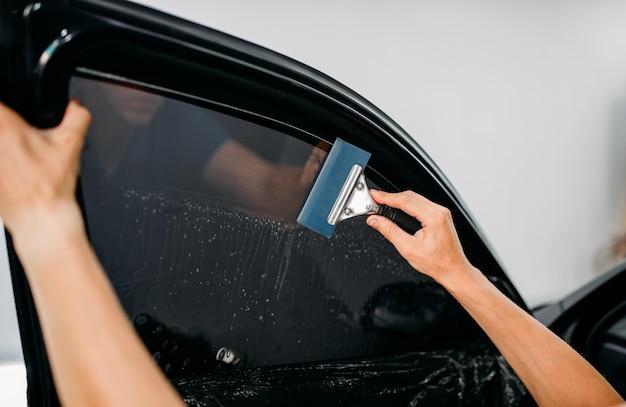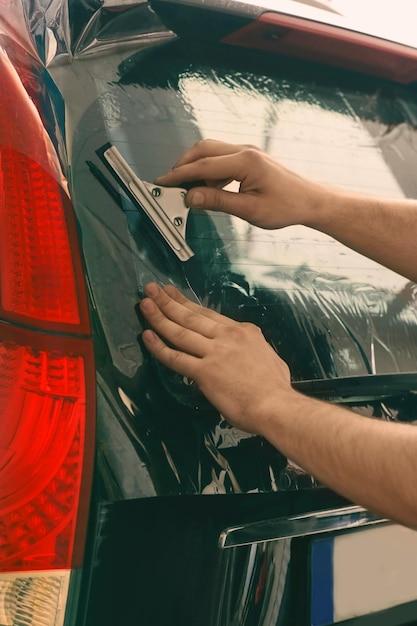When it comes to window tint, there are plenty of options available, each offering its own set of benefits. One popular choice that has gained significant attention is ceramic window tint. With its advanced technology and unique properties, it’s no wonder people are curious about its effectiveness and appearance.
In this blog post, we will dive deep into the world of ceramic window tint and address some common queries surrounding it. We’ll explore whether ceramic tint is darker than other options, if it changes its appearance as it cures, and whether it provides better heat-blocking capabilities. Additionally, we’ll compare ceramic tint to regular tint and determine if the extra cost is worth it. So, whether you’re considering ceramic tint for your vehicle or home windows, read on to gain valuable insights and make an informed decision.
Without further ado, let’s unravel the mysteries of ceramic window tint and discover how it can transform your driving or living experience.
Is Ceramic Window Tint Darker
If you’re someone who enjoys a touch of mystery and wants to add a layer of privacy to your car windows, then you’ve likely considered window tinting. While there are various types of window tint available in the market, one of the most talked-about options is ceramic window tint. In this subsection, we’ll explore whether ceramic window tint is indeed darker and unveil some fascinating tidbits about this popular window tinting choice.
Understanding Ceramic Window Tint
When it comes to window tinting, ceramic window tint stands out due to its unique composition. It is crafted using ceramic particles that are embedded within the tinting material. This composition not only provides excellent heat-rejection properties but also contributes to its exceptional durability. However, the question remains, is ceramic window tint darker than other types?
The Darkness Quotient
Contrary to popular belief, ceramic window tint is not inherently darker than other types of window tints. The darkness of window tint primarily depends on factors like the tint’s Visible Light Transmission (VLT) rating. VLT refers to the percentage of visible light that can pass through the tinted window. The lower the VLT rating, the darker the tint will appear.
VLT Ratings for Ceramic Window Tint
Ceramic window tint is available in various VLT ratings, allowing car owners to customize the darkness level to their preference while staying within the legal limits. Consequently, regardless of whether you choose ceramic, dyed, or metallic window tint, you can find options with similar darkness levels within each category.
The Advantage of Ceramic Window Tint
While ceramic window tint may not be inherently darker, it does offer distinct advantages over other types of window tint. Its advanced ceramic composition enables it to block a significant amount of infrared radiation, keeping the interior of your car cooler even on hot summer days. Additionally, ceramic window tint is highly effective in reducing glare, making it conducive for a comfortable driving experience.
The Importance of Professional Installation
Regardless of the type of window tint you choose, it is essential to rely on professional installation to ensure optimal results. A professional installer will not only help you select the right VLT rating for your needs, but they will also ensure that the tint is applied evenly and without any imperfections. This expertise is crucial in maintaining the desired darkness level of your window tint.
In conclusion, while ceramic window tint is often associated with superior heat rejection and durability, its darkness level is not inherently darker than other types of window tint. The darkness of the tint primarily depends on the selected VLT rating. Nonetheless, ceramic window tint offers numerous benefits that make it a popular choice among car owners. So, if you’re looking to enhance your driving experience with increased comfort and privacy, ceramic window tint is definitely worth considering.
FAQ: Is Ceramic Window Tint Darker
Ceramic window tint is a popular choice for car owners looking to enhance the appearance and functionality of their vehicle. With its advanced technology and benefits, it’s no wonder people have questions about ceramic tint. In this FAQ section, we’ll dive into some of the most commonly asked questions about ceramic window tint, providing you with all the answers you need!
Can You Put Ceramic Tint Over Regular Tint
No, it is not recommended to put ceramic tint over regular tint. Ceramic tint is designed to be the top layer and applying it over regular tint can cause bubbling, peeling, and interference with the tint’s ability to block UV rays and heat.
Does Ceramic Window Tint Look Different
Yes, ceramic window tint tends to have a slightly different appearance compared to regular tint. While regular tint can have a more reflective or metallic look, ceramic tint has a non-reflective, matte finish. This gives your windows a more sophisticated and sleek appearance.
Is Ceramic Window Tint Lighter
Ceramic window tint is not necessarily lighter in terms of shading. The darkness of the tint is determined by the percentage and type of ceramic film used. However, ceramic tint has the advantage of blocking heat more effectively than regular tint, meaning you can achieve the same level of darkness with a lesser percentage.
Does Ceramic Tint Darken as it Cures
No, ceramic tint does not darken as it cures. Once the tint is applied, it should retain its intended darkness level. The curing process only involves the adhesive fully setting and reaching its maximum effectiveness.
Does Darker Ceramic Tint Block Heat
Yes, darker ceramic tint does block more heat than lighter shades. The ceramic particles in the tint are designed to reflect and absorb heat, providing you with a cooler and more comfortable interior, especially during hot summer months.
Which Type of Tint is the Darkest
Ceramic tint is known for being one of the darkest types of window tint available. Its advanced technology allows for maximum heat and UV ray rejection while maintaining a visually appealing darkness.
Is Ceramic Tint Easier to See out of at Night
Ceramic tint does not significantly affect your visibility at night. It offers excellent clarity and does not distort your vision. However, it’s essential to keep your windows clean and free from any obstructions for optimal visibility.
Is Ceramic Tint Better Than Regular Tint
Yes, ceramic tint is generally considered to be superior to regular tint in terms of heat rejection, UV protection, and overall performance. It provides better clarity, durability, and a longer lifespan, making it an excellent investment for your vehicle.
Can You See out of Ceramic Tint Better
Yes, you can see out of ceramic tint just as well as regular tint or even without any tint. The advanced technology of ceramic tint ensures optimal visibility while still providing the necessary benefits of heat reduction and protection against harmful UV rays.
What Happens When Tint Cures
When tint cures, it means that the adhesive used to apply the tint fully sets and reaches its maximum effectiveness. This usually takes a few days, during which the tint may appear slightly cloudy. However, once the curing process is complete, the tint will become clear, allowing for better visibility.
How Do I Know if My Window Tint is Cured
You can test if your window tint is fully cured by lightly pressing on it with a clean, dry hand. If the tint feels firm and there are no signs of peeling or bubbling, it is likely fully cured. However, it’s recommended to wait a few days after installation before performing this test.
Can You See Through Ceramic Tint at Night
Yes, you can see through ceramic tint at night. The tint is designed to maintain optimal visibility while still providing the necessary privacy and protection during the day. However, it’s always important to ensure that your windows are clean and free from any obstructions for the best visibility.
Is Ceramic Tint Worth the Extra Money
Absolutely! Despite being slightly more expensive than regular tint, ceramic tint offers numerous advantages and long-term benefits. It provides superior heat rejection, UV protection, and durability, making it a worthwhile investment for those seeking quality and performance.
Is Ceramic Tint Lighter Than Carbon Tint
Yes, ceramic tint is generally lighter than carbon tint in terms of shade darkness. However, it’s essential to note that darkness levels can vary depending on the specific brand and percentage chosen for both ceramic and carbon tint.
Does Ceramic Window Tint Look Darker
Yes, ceramic window tint can give the appearance of being darker due to its non-reflective matte finish. This adds a sleek and sophisticated look to your vehicle while still providing the desired level of darkness and privacy.
Is Ceramic Tint Hazy
Ceramic tint should not be hazy when properly installed. If you notice any haziness or cloudiness, it could be a sign of poor installation or low-quality tint. It’s important to choose a reputable installer and opt for high-quality ceramic tint to avoid any hazy appearance.
Is Ceramic or Carbon Tint Darker
Ceramic tint is generally considered to be darker than carbon tint in terms of shade darkness. However, both types of tint offer excellent heat rejection and UV protection, so choosing between them should be based on personal preferences and specific needs.
How Long Does Tint Take to Cure
Tint typically takes a few days to fully cure. During this time, it’s normal for the tint to appear slightly cloudy or hazy. However, as it cures, the tint will become clear, allowing for optimal visibility and performance. It’s recommended to follow the installer’s guidelines for precise curing times.
That concludes our FAQ section on ceramic window tint. We hope this comprehensive guide has answered your burning questions and provided you with valuable insights into the world of ceramic tint. If you have any additional inquiries or concerns, don’t hesitate to reach out to a professional tint installer for expert advice. Happy tinting!

